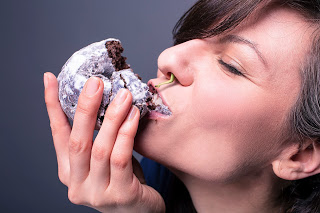Sometimes you just want to eat some doughnuts, chips, or ramen noodles. But, inevitably, there is a sense of regret. And then the internal berating: Why was I so weak? Why did I eat that crap? There are physiological reasons why your body has these cravings. In this guest post, Courtney Wyckoff of Mommastrong.com, writes about how you can make peace with your body and your cravings.
Your cravings are trying to tell you something
The truth is that our cravings are instructive. They are a flashing signal to our brains indicating what our bodies need. But we have to learn to read the signals. Sound strange? Courtney Wyckoff explains below how to read the signals and honor your cravings and your body.
By the way, I will be talking more about Mommastrong.com in future blog posts. They are a fitness program for moms. Their slogan is "Instigating an adventurous life through strength that matters." I appreciate their focus not on weight, numbers, or an ideal body type, but instead on internal strength. It is this type of strength, after all, that motivates us to keep fighting, keep working out, and to keep taking chances, long after the guilt and body shaming has ceased to work.
"Trust your body"
by Courtney Wyckoff
"Question:
Are you gonna tell your newborn infant to not associate an emotion when they
are feeding? Are you gonna ask them to deny the nurturing, the bond that
is formed when they receive two essential nutrients all at once from the hands
or boobs of their caregiver - love and food?
Heck no. In fact, if you did, you’d be called into question by every single pediatrician in the world. Well, at least the ones with jobs and credibility.
I’m here today
to redefine emotional eating. This oversimplified label reminds me of
back in the antiquated silly days when women were considered “hysterical” and
it creates an equal denial of who we are as gorgeous lovely souls housed inside
a working, miraculous animal of a body.
Your body knows what it needs to survive. Every second, every day, its incredible web of communication and its interconnected system is in constant pursuit of equilibrium. So, when it comes to eating, it calls upon emotions and sensations at times to get the nutrients it needs.
Your body is not weak; it just needs fuel!
And - listen
up carefully here - when it asks for something like
donuts, it’s not a reflection of your loose emotional hysterical self, but
rather the animal in you saying, “Oh, I need quick fuel and the best place I
got that from before was that weird round thing with a hole in it that was
super duper sweet. Yeah, that. As many I can get right
nowwwwwww.”
Your body
wants this because perhaps it’s all you’ve given it as a resource for super
fast fuel. Period.
The same goes for salt. Your body craves salty things because it’s adrenal system is probably out of whack due to stressful modern stresses and salt is an effective healer of this sort of imbalance.
The same goes for salt. Your body craves salty things because it’s adrenal system is probably out of whack due to stressful modern stresses and salt is an effective healer of this sort of imbalance.
We crave comfort foods when we are low. When we’re depressed. Why? Because comfort foods usually involve a heavy carb load, aka society's latest nemesis in the form gluten, which contain opioid peptides—amino acid sequences that affect the brain in the same way opiates do, targeting your endorphin receptors and making you feel pretty darn good.
Does all this
make us undisciplined, will-powerless, unhealthy humans? Does this mean
we all need to learn to be "better," to be more in control, to fix
our basic cravings and overcome what our body says it wants?
No way.
Here’s the turn-around.
Are you an
emotional eater? Yes. You are. You and you and you and
you. Even you in the corner with your kale smoothie, yes you too.
If you are not, well, I may have to check your head for an outer space alien
invasion chip. Do you want
things? Yes. Is food associated with something more than
fuel? Yes, it is. This is not the issue. The issue occurs
when we deny the animal in us, when we over-control our food and behaviors, and
when we convince ourselves that somewhere over the rainbow with the right diet
and the right crazy fat-blasting workout regime, we will magically melt into
our true healthy self.
Make peace with your cravings and your body
The next
immediate thing that develops is a resentful relationship with your very primal
nature. Our bodies respond to restriction with a heavier focus on that
which is restricted. And then we binge. We hurt ourselves.
And we enter into another label, far more appropriately designated than
emotional eating: Disordered eating.
This is
NORMAL. NO ONE is immune to this reaction of the inadequacies of how we
feed ourselves and care for our health these days. Maybe the alien chip
brain person, but not anyone I know and call a friend.
Develop a plan of action.
So, because
I’m all about solutions, here we go:
- Separate yourself from the animal of your body. Let it tell its story. Look at it objectively. What is it asking of you today, right now? What has it been through? How has it served you? How has it failed you? What is it missing for equilibrium? Remember, it’s NOT YOU. This is your body. Purely physical.
- When you experience a food craving, sit with it first. Don’t react. Put your hand on your heart and make a solid agreement that you will choose kindness and wisdom. And know that if you can’t sit with it, then you need some outside help in doing that. Seek that help.
- When you experience a behavior craving, sit with it. Don’t react. Put your hand on your heart and make a solid agreement that you will choose kindness and wisdom. And know that if you can’t sit with it, then you need some outside help in doing that. Seek that help.
- Start finding other resources for what your body wants and what its cravings are. See the chart below to get a jump start on that. Fill your day with these options and then be willing to wait a bit until your body starts wanting them. REPEAT: Be patient. Your body will not want them right away. It takes time. Be patient. Be willing to screw up. Be ok with beginning again.
- Introduce and reclaim indulgence not as a “fuck it, I deserve it” reaction, but as a conscious surrender to the beauty that it is to be here, amongst taste and sensation and life as much as you can.
- Teach your body resilience. No matter what, never blind yourself to a perfect diet or fitness program. Do not, unless you have an allergy or specific condition, restrict yourself entirely. Deliberately mess up. Deliberately give your body reasons to bounce back. Take a day or two off of exercise. Take risks. Eat a piece of cake. Involve yourself with pleasure. Be an adventurer in the sensations of being alive and remind yourself "I can handle this."
- Create a unique formula for your own individual wellness. Do not bet on what works for Gillian Michaels or your neighbor with a six pack or that chick you saw at Kroger buying a gallon of kombucha. Start building and refining what works for your composition. What makes you feel good? What makes your body feel like crap? And if you have to walk away from a food or behavior because it is harming you, then grieve it. Be emotional about it for as long as you need and then get re-aligned with that formula.
- Do not run away from your vital self. Like, ever. Wait, a better word: Trust your vital self. Hold up, an even better word: Love your vital self."
*********************************************************************************
Courtney also wrote an article about specific cravings, what they are telling your body, and how to satisfy them. It is really helpful!
If you are struggling and would like help, we have Houston, Texas Counselors who can meet with you. You can contact us at 713 -591- 3612 or by email at Nancy@wilsoncounseling.org. This blog is not intended to substitute for professional counseling.
Courtney also wrote an article about specific cravings, what they are telling your body, and how to satisfy them. It is really helpful!
If you are struggling and would like help, we have Houston, Texas Counselors who can meet with you. You can contact us at 713 -591- 3612 or by email at Nancy@wilsoncounseling.org. This blog is not intended to substitute for professional counseling.
*Article used with permission from Mommastrong.com. Headings & title have been added by Wilson Counseling.





Comments
Post a Comment